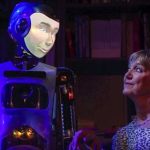 Last summer the Science Museum launched an exhibition charting the 500 year history of robotics. Featuring a unique collection of over 100 robots, from a 16th-century mechanical monk to robots from science fiction and modern-day research labs, this exhibition will enable visitors to discover the cultural, historical and technological context of humanoid robots.
Last summer the Science Museum launched an exhibition charting the 500 year history of robotics. Featuring a unique collection of over 100 robots, from a 16th-century mechanical monk to robots from science fiction and modern-day research labs, this exhibition will enable visitors to discover the cultural, historical and technological context of humanoid robots.
Of course, for many of us, our perception of robots comes via their representation in popular culture. This somewhat symbiotic relationship was forged in 1920 when Czech author Karel ?apek first coined the phrase in his play R.U.R, or Rossumovi Univerzální Roboti (Rossum’s Universal Robots).
In Czech, robot means slave, and popular culture has tended to have a somewhat dystopian relationship with robots ever since, whether it’s the psychotic HAL in 2001: A Space Odyssey or the T-800 Model 101 cyborg Arnold Schwarzenegger played to such chilling effect in Terminator.
Even more modern incarnations such as A.I. Artificial Intelligence or Ex-Machina, the robots have an other-worldly and rather menacing presence, and that’s before we even get into Blade Runner.
Realistic portrayals
Whilst these have been undoubtedly influential in how understanding of robots and AI, you could well argue that they aren’t especially realistic, and typically aren’t grounded in the state of robotics at the time they were made.
That’s certainly not an accusation that can be labelled at a recent play from Pipeline Theatre called Spillikin. They cover an area that I’ve written about extensively in recent years – the use of robots in elderly care.
For instance, devices like the Robit have been deployed in home environments to provide a range of domestic support, whilst a number of studies have examined the impact of robots in elderly care environments. The studies found that the robots become welcome members of the community and provide a range of services, from medicine reminders to general companionship.
It should come as no surprise therefore, that researchers have also found robots to be effective in a wider range of nursing environments. Whilst the team are confident in the skills of their robot, they don’t envisage a time where humans will play no part in healthcare. Instead, they believe robots will augment and compliment the skills of human healthcare professionals.
Or you’ve got IBM’s MERA (Multi-Purpose Eldercare Robot Assistant), which was developed with Rice University. The device, which comes with Watson enabled intelligence inside it, is designed to help both the elderly patient and their caregiver. The first foray of the robot into the marketplace will come via Sole Cooperativa, an Italian healthcare provider, with MERA located in senior housing to monitor the day-to-day activities of the residents.
The Spillikin
The Spillikin revolves around the relationship between robotics whizz Raymond and Sally. Raymond has a genetic disorder that gave him a high probability of dying at a young age, and so he developed a robot to help provide Sally with a connection to him after he died.
The story took on a fresh twist when it emerged that Sally was suffering from Alzheimer’s, and the audience were asked to ponder the role the robotic Raymond was playing in her condition.
The writer Jon Welch had worked with a number of researchers in this field, and indeed the play had received financial support from the Wellcome Trust, so it was nice to see a robot given a cultural reference point that is both realistic and current. With robots slowly being deployed in care homes, these are exactly the kind of questions we will be having.
Suffice to say, the play doesn’t provide any answers with regards to how machines will function alongside the neediest of humans, but it does nonetheless portray them in a more realistic light than many of the dystopian tales told in the past.
Popular culture undoubtedly plays a huge role in shaping our perceptions of new technology, so that is certainly something to be welcomed. The play is touring the country for a little while yet, and you can see the trailer for it below.